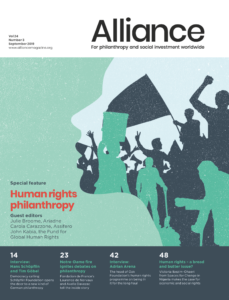Many activists, policy makers, members of the public and scholars believe that human rights worldwide are getting worse. This month’s Alliance issue highlights the many challenges that human rights groups are facing today linked to increasing levels of inequality, far right ideologies, climate change, populist rejections of human rights norms, and government restrictions on NGO operations. These concerns are echoed in Human Rights Watch’s annual human rights report published in 2019 that describes how ‘would-be autocrats’ in democratic countries and established dictators are currently undermining human rights at an alarming rate.
However, there is some positive news: Respect for human rights has improved over time. Systematic empirical evidence on this topic shows the positive change that human rights law, institutions and activism have produced over the past four decades worldwide. This global trend coincides with the spread of democracy, human rights norms, and new technologies that raise the costs of violating human rights and improve civil society’s ability to monitor, report and disseminate information on human rights[1]. Thanks to human rights groups, the quality, quantity and availability of information on human rights abuses in the public domain is greater than ever before. Moreover, their advocacy work at the domestic, regional and international level has led to an increase in the different types of human rights and discriminated groups recognized over time.
While the global trend of respect for human rights over the past 40 years has been positive, many activists, policy makers, members of the public and scholars agree with the guest editors of this month’s Alliance issue, Julie Broome, Carola Carazzone and John Kabia, assessment that ‘the human rights movement is entering a state of transition’. In the current political climate, they argue that economic, social and cultural rights must be integrated into the work of human rights groups that promote civil and political rights. In order to improve and measure economic and social rights, the Human Rights Measurement Initiative (HRMI) have created a free interactive database that allows users to explore how countries around the world perform on these rights ‘relative to what is feasible for a country with that level of economic resources’. Their current database includes metrics on the right to food, education, health, housing and work for between 120 and 160 countries over the past ten years.
In addition to the guest editor’s suggestions of enhancing the protection of human rights, Kathryn Sikkink identifies a number of policy tools for addressing human rights violations in the 21st century in her book Evidence for Hope. This includes the need to reduce conflict, seek non-violent solutions, promote democracy, combat dehumanizing and exclusionary ideologies, encourage governments to ratify and enforce human rights laws, end impunity, and strengthen transnational human rights networks[2]. In this period of transition, it is crucial that human rights groups receive adequate funding for their work to promote and protect human rights.Philanthropists and social investment have an important role to play in building a human rights movement fit for the future and might consider investing in organisations that are implementing these existing and new approaches to promoting human rights
Rebecca Cordell is Assistant Professor at University of Texas at Dallas
 At $2.8 billion per year, Human rights funding amounts to 5 per cent of all giving.
At $2.8 billion per year, Human rights funding amounts to 5 per cent of all giving.
Yet the very idea of the open, liberal, and democratic society underpinned by respect for human rights is under attack. Explore the eco-system of funders and activists stemming the tide.






Comments (0)